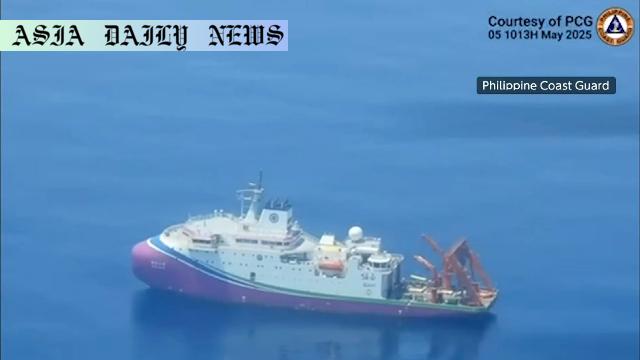Philippine Coast Guard detects illegal Chinese research in EEZ.
Philippine Coast Guard detected a Chinese research vessel conducting illegal marine research in its exclusive economic zone (EEZ).
The activity reportedly involved deep-sea mapping possibly aimed at supporting submarine navigation.
The area is geographically strategic as it connects to the Western Pacific near Southern Taiwan.
The Philippine Coast Guard deployed a patrol ship and aircraft to urge the vessel out of the EEZ.

Illegal Activity Detected in Philippine EEZ
The Philippine Coast Guard recently reported the unauthorized presence and actions of a Chinese research vessel within its exclusive economic zone (EEZ). This incident occurred off the northwestern coast of Luzon Island in the South China Sea, a region of considerable geopolitical importance due to its proximity to southern Taiwan and access to the Western Pacific. According to the coast guard spokesperson Jay Tarriela, the ship engaged in potentially strategic activities, including deep-sea mapping, which could support advanced submarine navigation.
Surveillance and Evidence Collection
The incident reportedly spanned several days from Thursday through Monday, during which the Philippine Coast Guard actively monitored the situation. Surveillance teams captured video footage, presenting evidence of the vessel’s activities. One video depicted a deep-sea submersible designed to operate at depths of up to 4,500 meters, while another documented an inflatable boat conducting equipment recovery operations. These elements suggest a coordinated and technically advanced research mission conducted without prior permission from the Philippine authorities.
Strategic Significance of the Region
The location of these activities underscores its importance. Connecting the South China Sea to the Western Pacific, the region is not only a vital area for diverse marine operations but also holds strategic military implications. Proximity to southern Taiwan further amplifies global concerns, emphasizing the need for vigilance and swift action by regional stakeholders. The presence of unauthorized vessels in this critical area poses risks to both national sovereignty and regional stability.
Philippine Response and Heightened Surveillance
In response to this violation, the Philippine Coast Guard dispatched a patrol ship and aircraft to confront the vessel and demand its departure. Despite this effort, the incident highlights the recurring challenges faced by nations in asserting their rights in disputed and strategic waters. To prevent future occurrences and ensure maritime security, the Philippines has affirmed its commitment to enhancing surveillance measures in the area. This incident underscores the importance of international maritime laws and respect for territorial boundaries.
Wider Implications and Regional Tensions
Beyond the immediate concerns of the Philippine EEZ, this event feeds into the larger context of rising maritime tensions in Asia. The South China Sea remains a hotspot for disputes involving overlapping territorial claims and significant international attention. Unauthorized activities such as these exacerbate existing conflicts and undermine regional trust. Calls for dialogue, cooperation, and adherence to regulations by all parties have become more urgent than ever.
As the Philippines ramps up its preparatory efforts for monitoring its waters, the international community continues to emphasize the importance of upholding the rules-based order to ensure long-term peace and stability in the region.
Commentary
Geopolitical Intrusions: A Rising Concern
The recent discovery of a Chinese research vessel conducting unauthorized activities in the Philippine EEZ brings to light a recurring pattern of territorial disputes in the South China Sea. This incident underscores the challenges that smaller nations face when confronting infringements by larger, more militarily equipped countries. The deployment of Philippine Coast Guard patrols serves not only as a defensive measure but also as a critical assertion of sovereignty and the defense of international maritime law.
Importance of Sovereignty and Maritime Integrity
From a broader perspective, the importance of the rule of law in contested waters cannot be overstated. Every instance of unauthorized activity chips away at the notion of fair play and mutual respect among nations. The Philippines’ proactive response to this situation is a commendable effort to safeguard its maritime integrity. However, increased collaboration among Southeast Asian nations and enhanced international oversight are necessary to dissuade further violations.
Strength in Unity: Preserving Regional Stability
As tensions continue to rise across Asia, the need for multilateral cooperation between nations is evident. Organizations like ASEAN, in conjunction with international allies, could play a pivotal role in navigating and resolving these disputes. Consistent dialogue combined with robust action is essential to maintaining the balance of power in an increasingly contested region. The incident serves as a stark reminder of the necessity for vigilance, unity, and shared determination in addressing maritime security threats.
Long-Term Lessons and Global Responsibility
Ultimately, this event calls for greater global attention to the implications of unauthorized marine operations. It stresses the importance of safeguarding sovereign interests while fostering regional and international frameworks that discourage such behavior. Beyond just a regional dispute, the unauthorized research activity highlights the interconnectedness of global maritime issues, emphasizing the shared responsibility in preserving stability and peace for all.


